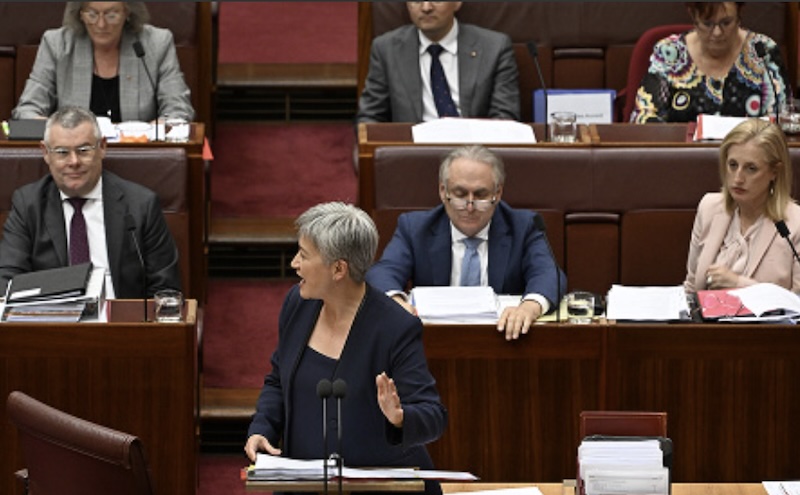
Coverage of the week’s polls concentrated on the Coalition’s plunge, its road to nowhere. But Michael Pascoe says it’s overshadowed an unrequited political desire: a “Teal” Senate ticket.
On the latest Newspoll and Resolve polling, the duopoly parties now run second and third. First place goes to the collective “others”. The Redbridge poll had “others” tied with Labor.
Newspoll scored the Coalition receiving just 27 per cent of primary votes, Labor 36 and the others 37.
Within those others, One Hanson (also known as One Nation) was on 10 per cent, Greens 13 per cent and the real “other” others, 14 per cent.
And that 14 per cent understates the support community independents received in the House of Reps in May when an alternative is offered. Eight Teals won, but of the 35 community independent candidates, 22 received more than 14 per cent of the primary vote, 29 reached double digits, more than enough with half-reasonable preference flow to win a Senate seat.
Lagging political sentiment
By the nature of half-Senate elections and six-year terms, Senate membership will always lag political sentiment. Now it is particularly out of kilter with voters’ thinking.
As it catches up with the electorate, the Senate will become ever more difficult for the duopoly parties to corral. While it’s very difficult to see the Coalition returning to government in any election soon,
it is impossible to even imagine any single party ever having a Senate majority.
What’s missing from the Senate’s present and horizon is a rational centrist group to leverage better policy, to “keep the bastards honest” as the Australian Democrats once pledged to do. The latest polling and the success of community independents campaign in the lower house show that is what a considerable percentage of Australians want but are not being offered.
Don’t call us Teal
The bad news is logistics and the nature of community independents, the “Teals” as they don’t like to be called, mean there’s little chance of it happening.
The present Senate numbers are 29 Labor, 27 Coalition, 10 Greens, 4 One Hanson, 3 Senators who deserted the parties they were elected to represent (one ex-Labor, one ex-Green, one ex-Jacqui Lambie Network) and three others: Jacqui Lambie herself, the embarrassing but passing joke Clive Palmer’s money bought in Victoria, alias Ralph Babet, and David Pocock, very much a community independent.
So just one community independent out of 76, and that from the ACT which is more like a House of Reps contest.
The need is there in the Senate, the desire and votes are there for it, but the Teals are not.
The problem with a Teal Senate ticket is that it needs to be a political party to be above the line and being a political party is a contradiction of what the community independents represent – independents who are not members of a party, who concentrate on representing the views of their electorate, not Party HQ.
The candidates are chosen by their community movements. The volunteers who do the campaigning know their candidate. There is no state-wide community movement to do the kitchen table policy development and candidate selection.
A party for the Senate?
Could the existing Teal MPs coalesce enough to support a party for the Senate without being members of such a thing? That would be hard for them. They differ too much on matters other than climate and integrity.
But without the support of the existing community movements, the numbers needed to man polling booths, let alone door knock, are forbidding.
A prime mover for one of the successful community independent MPs tells me the ideal would be to have 800 volunteers in each electorate on the basis of two people working two hour shifts at each polling booth. That could be reduced to about 300 volunteers if they did tough 10-hour shifts on election day and pre-polling.
It would be much easier if lower house community independent volunteers were prepared to hand out Senate how-to-votes as well, but to have a crack at the Senate, every electorate would need to be covered.
The ‘sensible centre’
Assuming Labor retains a strong majority in the lower house for at least the next two elections, the cross-bench MPs have limited leverage. The Senate is where leverage can be exercised but where, on the present unrepresentative representation, it tends to be all over the shop and subject to ratbaggery.
The sensible centre is set to be increasingly craved by much of the electorate while Labor is content to be just a little less Liberal Party than the Liberal Party and the Coalition implodes and turns more One Hanson.
The desire is palpable but the means aren’t there. And that’s why we can’t have nice things.